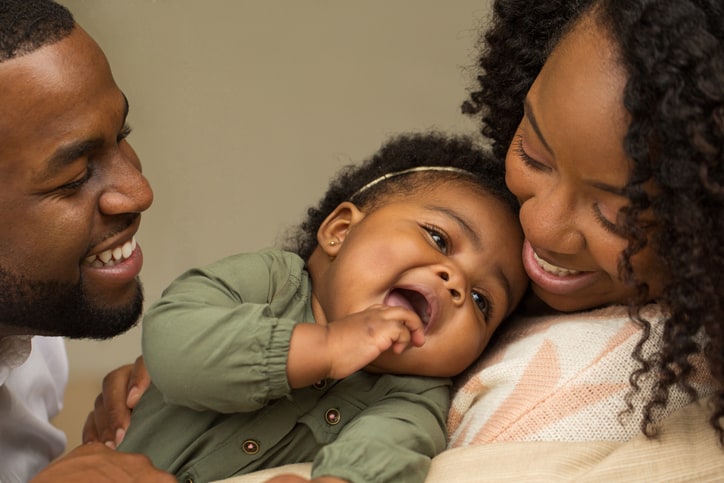That first roll from front to back, the first unaided step, the first real word – these are important developmental milestones that can indicate your baby’s physical wellbeing and health. At Alzein Pediatrics, we know that there are other milestones just as important – and often more rewarding for parents to see. These are the social and emotional milestones like smiling, laughing, comforting and dancing. These behaviors show how your baby is responding to people and objects in ways that express emotion.
The research on prosocial behaviors in infants is relatively new. For decades, scientists thought that most smiles before the age of 2 months were the result of a triggered response to a sensation, like passing gas or feeling a tickle or gentle draft. Now, newer research suggests that some of these are true social smiles, meant to communicate comfort and joy. We recommend you and other caregivers (even older siblings!) interact with your infant face to face as much as possible, reinforcing and developing this innate prosocial behavior through active engagement. Just as talking regularly to your baby helps with language development, exchanging smiles with your baby helps them develop their ability to express happiness and comfort.
Once your infant masters smiling, they’ll begin experimenting with one of the most delightful prosocial behaviors you’ll ever hear: laughing. Babies typically hit this developmental milestone in the 4-6 month age range. While we adults might use laughter to signal a variety of things, laughter in infants is a bit simpler. Infants laugh when they are happy; an infant’s laugh says: “I like that!” This behavior continues to develop as your baby has opportunities to connect laughter to a happy feeling and a positive social outcome. The more you laugh with your baby, the more opportunities they have to see what expressing joy looks like.
As your baby gains more control over their physical body, they can begin expressing emotions in more complex ways. While your infant can tell the difference between your hug and a stranger’s hug by 3 months of age, they might not start hugging you back until they’re 8-12 months old. Infants have physiological responses to being hugged by their parents. An infant’s heart rate and eye movements change when being hugged. That creates a powerful positive feedback loop for the infant to associate comfort and happiness with the behavior. As they near their first birthday, babies have learned to appreciate the value of a good hug and to reciprocate as a source of comfort for themselves and others, a sign of prosocial behavior. Prosocial behaviors develop because of positive socializing, so while you probably don’t need another reason to hug your baby, go ahead and give them some another squeeze.
The first time you see your baby sway, pump or move to music, you may think, “How did they learn that?” Well, they learned it from you! While still in the womb, your baby learned to dance from the pregnant person’s movement while hearing music. You and other caregivers have rocked, swayed and boogied with your baby – probably every single day in some fashion – since they were born; being human is to dance. Dance is found universally, throughout all cultures, and promotes attachment between child and caregivers, while also promoting prosocial behavior. While your child may not be able to move quite to the beat until they are entering kindergarten, they can change pace between fast and slow. Play all kinds of music and dance together often, be it held in your arms or on your feet as your child grows.
Developmental milestones of all types are important for your baby. Just like you schedule tummy time, schedule time to smile, laugh, hug and dance together to develop the social and emotional skills needed for positive relationships throughout your child’s life.
Your providers at Alzein Pediatrics realize that, often, being a new parent can be emotionally draining, making it difficult to smile and laugh with your baby, especially in the first months. For mothers and parents suffering from postpartum depression, it can be difficult to provide positive emotional feedback for their growing infant; maternal depression is considered a risk factor for atypical socioemotional and cognitive development. When you suspect you or a loved one is suffering from PPD, please reach out to us or another healthcare professional as soon as possible. Taking care of your own emotional health is just as important as taking care of your child.


